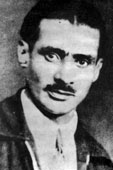
Al-Antari: Pious Singer [Archives:1998/41/Culture]
October 12 1998

Leaving to Ethiopia:
Before the revolution of September, ’62, singing was condemned by the Imam. Because of that Al-Antari decided to flee to Ethiopia where he would be freer to continue his artistic journey. There he met with Mohammed Sha’aban who went to Ethiopia for the same reason. Sha’aban made Yemeni songs famous all over Ethiopia.
Al-Antari traveled between Ethiopia and Djibouti until he, lastly, settled in Al-Sheikh Othman in Aden. There it was different – singing was not regarded as a crime as in North Yemen. “Al-Makhader” or singing sessions were very common at wedding ceremonies. Through Al-Makhader, Al-Antari proved himself as a singer to the people of Aden. His good voice immediately made him well-known locally and soon his records were available in record shops.
Al-Antari was “one of the common people” as they used to call him. This term meant that he was much respected by the general public. What was really different about him was that he was both a singer and a religious man. His voice was tender while reading the holy verses of the Qura’an. When people heard him call for prayers they used to hurry to the mosque.
Sheikh Al-Rodaini related this story about him: “Once, on a Ramadan dawn, I heard a nice voice calling for the dawn prayers in a small mosque in Aden. As I went there I found that many people from the same neighborhood and nearby neighborhoods were coming to the mosque and all were wondering about the new Muadhin. The man was Al-Antari.
The regular Muadhin was upset, asking who dared take his position. He pulled Al-Antari off the pulpit and kicked him outside the mosque. People became very angry. They brought Al-Antari back to the pulpit.”
This anecdote shows how he was loved by all people. “After the night prayers, Al-Antari used to wear different clothes so that nobody could recognize him. He used to go to deserted places taking with him the violin to play all night.” says Abdulqader Bamakhramah, a contepmporary singer.
It was a habit in Aden those days that in the “Makhader” a singer had to sing all day and night long. Sometimes, more than one or two singers were invited to sing in the ceremony. Al-Antari used to prepare himself well for such occasions. His wide knowledge of poetry and the artistic heritage of Yemen and the Arab Peninsula made him more confident to enter competitions than any other singer. Being a perfect lute player, he also used to play some Egyptian and Indian musical compositions.
Al-Antari was influenced by the school of Ibrahim Saeed. Later on, he represented a unique school of singing. Othman Ali Othman, Ethiopia’s first singer, learned the principles of singing from Al-Antari.
Al-Antari was one of the pioneers of the Yemeni song. “He was a man who valued the real art. He did not hesitate to criticize singing if it had no value and would praise originality whenever he found it,” said Haj Hassan Awni Al-Ajmi. Approximately 25 records of Yemeni and African songs performed by him were recorded by Al-Taj Al-Adani Gramophone Company.
His last days:
Al-Antari lived his last days in Sanaa. There, he would join Mohammed Mousa and his companions in singing sessions and with them he left many of his works. He died in 1965. It is worth mentioning that Al-Antari was made a hero in a story published by Al-Nahda Library in Al-Faggalah, Egypt. A children’s story, “The Yemeni Musician” was written by the Egyptian writer Metwalli Atyyah.
By Saleh Abdulbaqi,
Arts Editor Yemen Times
——
[archive-e:41-v:1998-y:1998-d:1998-10-12-p:./1998/iss41/culture.htm]


